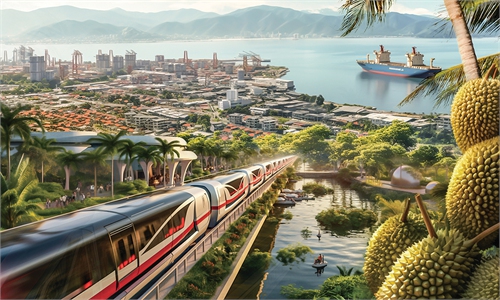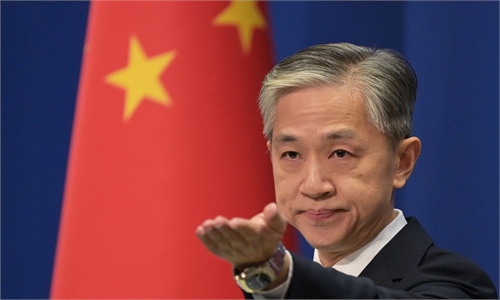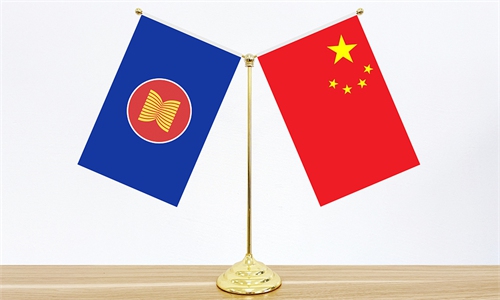Chinese firms help bridge African economic artery, enhance devt capacity under BRI, defying ‘debt trap’ smear
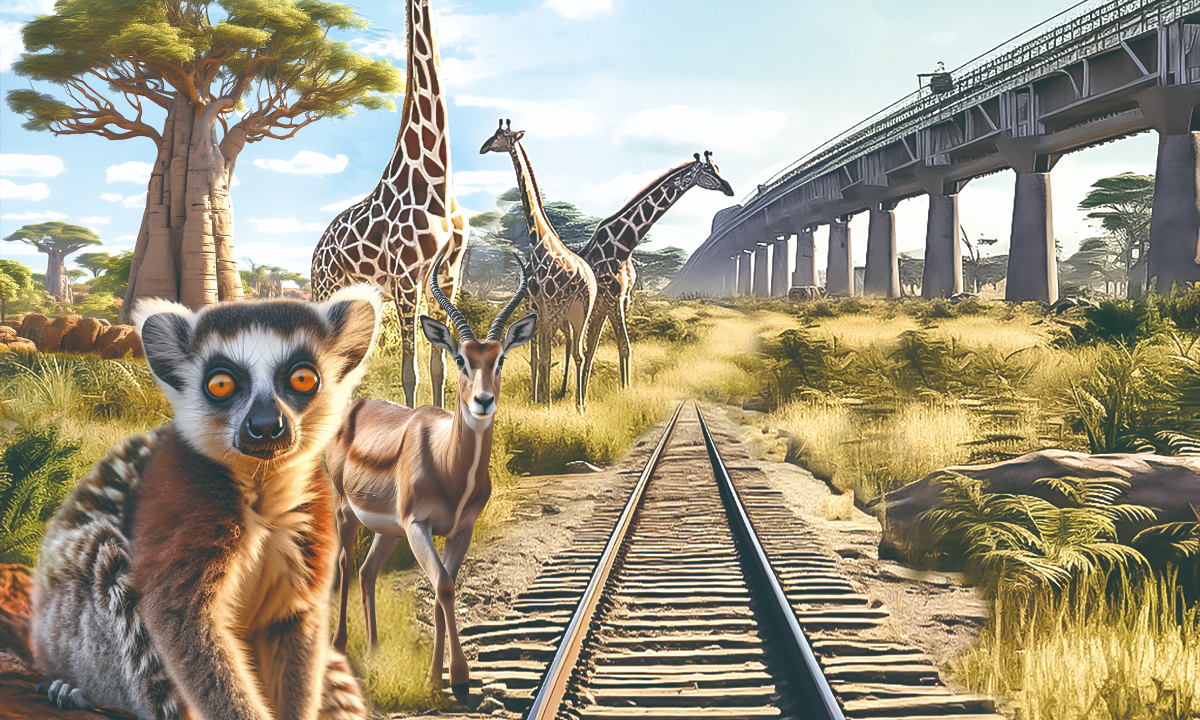
Graphic: Global Times
Editor's Note:
One is the largest developing country, and the other is the continent home to the largest number of developing countries. China and Africa are tens of thousands of miles apart but cooperate closely. Now, the connection of China and Africa has become closer under China-proposed Belt and Road Initiative (BRI).
China has inked BRI cooperation documents with 52 African countries and the African Union Commission. Driven by the initiative, Africa has ushered in comprehensive investment and infrastructure upgrades, including ports, railways and roads. Meanwhile, more and more African people are dreaming of a future full of opportunities made possible by the initiative.
This is the second installment of a special series, based on stories by Global Times reporters after they visited a variety of countries and regions in Southeast Asia, Central Asia, Africa, Central and Eastern Europe, as well as the South Pacific, where they witnessed first-hand the success of the BRI and how it has improved life in those countries and regions. The latest installment focuses on how the BRI has helped usher in a new era of development in Africa over the past decade.
Fei Rongwei, a civil engineer from a Beijing-based firm, still remembers his first sight when he landed at Antananarivo Ivato International Airport in Madagascar.
"The vast area that caught my eye was yellow soil without any highways, and such poor infrastructure conditions can hardly been found in China," Fei told the Global Times. "As a civil engineer who has spent half of my life building roads around the world, I think I came to the right place."
The 47-year-old Fei arrived at the airport in October 2015. Four years later, the renovation construction of Route Nationale 5A (RN5A) of Madagascar was started by China Road and Bridge Corporation. The project, described as "the works of the century," is a piece of infrastructure long awaited by the people in the northern part of the country.
With a length of 151.7-kilometer, it took up to 12 hours to drive in the dry season, and even longer in the rainy season due to the mud before the renovation.
The road was once featured in a documentary named Les Routes de L'impossible by France Television, which told the story of a car that could only drive two kilometers per hour for the bad road condition.
After the renovation, it only takes 2.5 hours running from Ambilobe to Vohemar, greatly shortening travel time in northern Madagascar.
The renovation of 5A road is a mirror of the China's infrastructures investment in Africa as part of the BRI proposed by Chinese President Xi Jinping in 2013.
Aside from the RN5A, Chinese enterprises are also actively engaged in the projects in Africa such as the Mombasa-Nairobi Standard Gauge Railway (SGR) in Kenya, the Addis Ababa-Djibouti railway, also known as the Ethiopia-Djibouti railway, Nigeria's Akka Railway and the East-West highway in Algeria.
In the past 10 years, China's centrally-administered state-owned enterprises have carried out more than 1,600 projects across Africa, making a positive contribution to improving standards of infrastructure in Africa, according to the State-owned Assets Supervision and Administration Commission which works under China's State Council.
All those interviewed by the Global Times from general managers of the projects, frontline employees, and local residents in Ethiopia, Kenya and Madagascar could not stop expressing their excitement and expectation over the benefits that the road and rail projects have created under the framework of BRI, as these projects also help raise the local incomes and improve the living standards.
They said they are very proud to be part of the BRI, because this grand strategic vision can benefit Africa, allowing them to grow together. They slammed the "debt trap" hyped by the West, saying that denying African development is one tradition of the colonial period left by the West.
In the recently concluded China-Africa Leaders' Dialogue held in Johannesburg on August 24, Chinese President Xi Jinping urged China and Africa to join hands for modernization.
China is willing to launch the Initiative on Supporting Africa's Industrialization, which will support Africa in growing its manufacturing sector and realizing industrialization and economic diversification, Xi said.
Injecting vitality to local economy
"The project has changed my life, as it not only brings my family a better life, my wife and kids have less complaints than before," Rabearintsoa Mahatoky Fanantenana, a local translator working as part of the RN5A said, sharing his feeling with the Global Times.
In his eyes, the project has provided a lot of jobs for locals, especially for young people as most of them could hardly find a job in the past, and this project has given many accesses to a stable income while also improving their quality of life.
Similar views are shared by Nebiyu Melaku Alemayehu, who is from the Ethiopia-Djibouti Railway Share Company. As head of the company's human resource department, he has worked as part of the project for 11 years, witnessing the Chinese-built railway starting from zero.
"There were no lights, no telecom services and no road at the beginning, but now, you can see a lot of factories, warehouses and people living along the railway," he said.
During the construction of the railway, more than 50,000 local jobs were created, while more than 4,000 jobs were filled during the operation period, China Civil Engineering Construction Corporation (CCECC), the builder and the operator told the Global Times.
GT reporters noticed that there are booths selling carrots and peppers near a railway cross along the route, along with roadside coffee stalls. The cars are rolling along the road while kids are playing around, injecting new vitality into the region.
With the accelerated implementation of the BRI, China's support for Africa's infrastructure has been unprecedented, making an important contribution to breaking a major bottleneck which has long held back Africa's economic development.
Mohsin Chaudhry, general manager of Autoports Nairobi Freight Terminals Ltd, a railway cargo business dealer in Nairobi, Kenya, is one of the businessmen who has enjoyed the benefits delivered by the Chinese-built Mombasa-Nairobi Standard Gauge Railway (SGR).
"The amount of cargo that we can transport from the port of Mombasa in a day is significantly higher, compared to the past. Our company did not have one single incident of losing shipments since we started operating two years ago, now we're able to offer more stability in terms of pricing," he told the Global Times.
He said the railway is responsible for the transportation of critical commodities, for example, wheat, cooking oil, which plays a critical role in stabilizing the economy of the country.
"So definitely the impact of the railway is absolutely tremendous on the country. And it's remarkable even in the way that the project was delivered in time. I think that was really, really positive, and it was really a plus for us," he said.
"We want to see SGR linking different cities in Kenya. I think that would be a major plus for us for the economy," Chaudhry said.
Currently, the Mombasa-Nairobi SGR has shipped a total of 10.3 million passengers and 27 million tons of cargo, adding 1.5 percentage points to Kenya's GDP growth, according to China's Ministry of Foreign Affairs.
The Kaliti sewage treatment plant operated and maintained by CEEC Gezhouba Group is located in the southern region of Addis Ababa, the capital of Ethiopia.
The plant can process 75,000 tons of sewage every day, with a maximum capacity of 100,000 tons. At present, it serves about 600,000 people in the area around the capital. The sewage treatment plant is not only the largest in Ethiopia, but also the largest in Southeast Africa.
There are more local residents planting vegetables near the sewage plant, and it is helping locals increase their income, said Wu Xiaoping, deputy project manager from the Kaliti sewage treatment plant with CEEC Gezhouba Group.
We hope that we can bring more independent intellectual property rights and advanced technology to Africa as part of the BRI, and contribute to the construction of a beautiful Africa, Wu added.
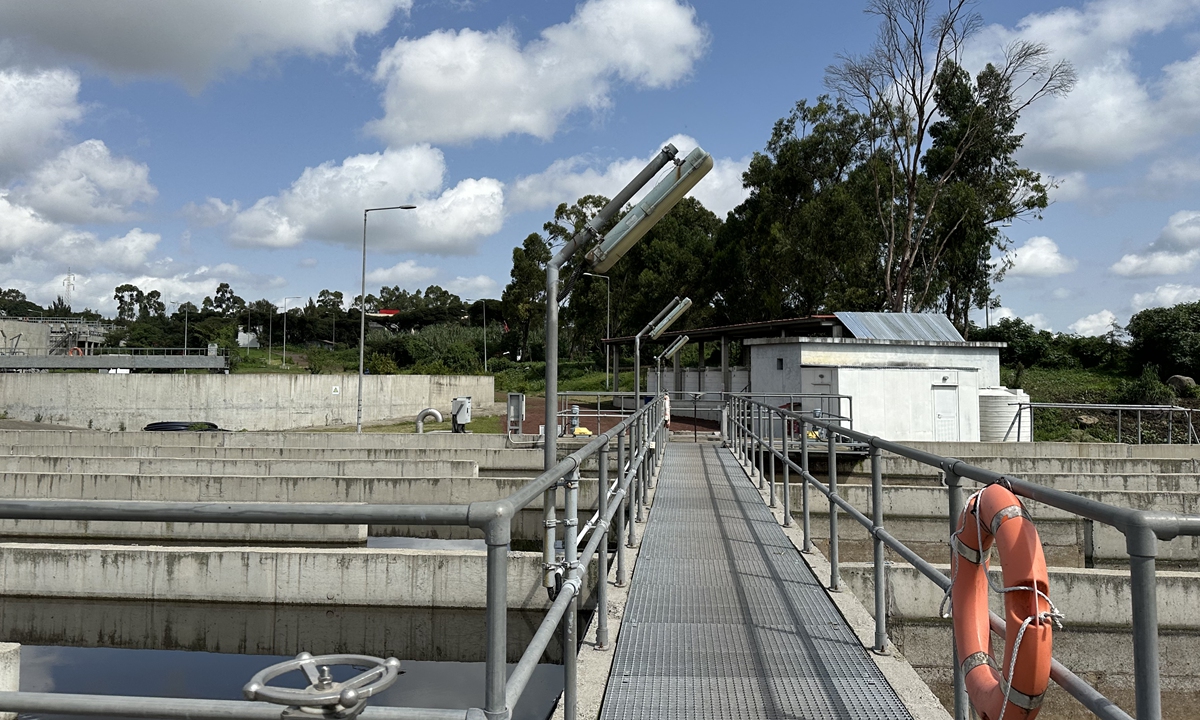
The Kaliti sewage treatment plant maintained by CEEC Gezhouba Group in Addis Ababa, Ethiopia Photo: Tu Lei/GT
Boosting interconnection
The Mombasa-Nairobi SGR started operating six years ago, linking up East Africa's largest port city of Mombasa to the country's capital Nairobi. After the operation began on May 31, 2017, the travel time between Nairobi and Mombasa has been shortened from the original 10 hours to less than four hours, which injected renewed vitality into the local economy.
Some people have been able to access business opportunities with the help of the railway, it has also improved the tourism sector, Brian Boro, assistant manager of dispatch center with Mombasa-Nairobi SGR, told the Global Times.
Passengers now can arrive at Mombasa earlier than ever before, and it has really helped the cargo in terms of reducing the number of trucks on the road, and helped the efficiency of the port loading of the cargo, he added.
In addition, it has also helped boost the business at Mombasa Port, the largest port in East Africa, which has 17 international routes and maintains business links with about 80 ports around the world, making it the lifeline of the economic development of many countries in East Africa.
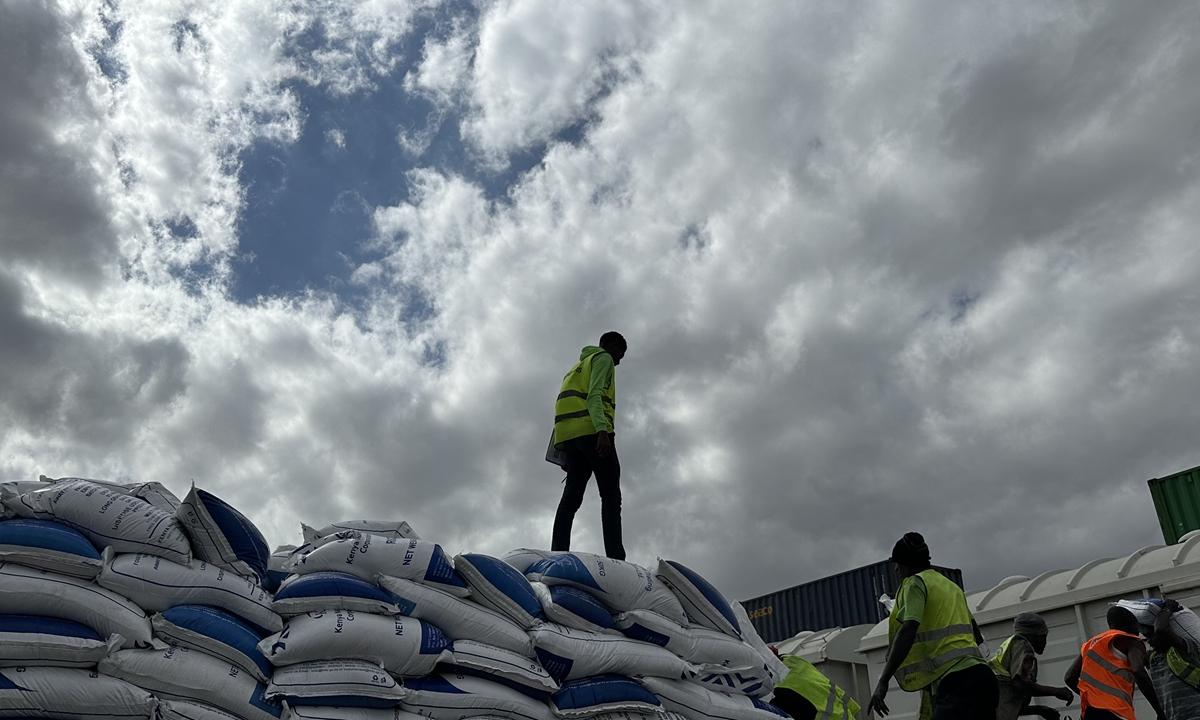
Workers at a cargo terminal of the Mombasa-Nairobi Standard Gauge Railway in Nairobi, Kenya on August 8 of 2023 Photo: Tu Lei/GT
As a mark of its importance, in July of this year, President of Kenya William Samoei Ruto met in Nairobi with Member of the Political Bureau of the CPC Central Committee and Director of the Office of the Central Commission for Foreign Affairs Wang Yi, who was visiting Kenya.
China has provided valuable assistance for Kenya in its infrastructure construction through their partnership, and the Mombasa-Nairobi railway, as the landmark project, has thoroughly changed the look of Kenya, said Ruto.
As a flagship project under the BRI, the Ethiopia-Djibouti railway is celebrating its 5th anniversary this year.
As the first transnational electrified railway in Africa, the 752.7-kilometer rail line has shortened the original five or six-day journey to only one day, and it has delivered a new level of convenience and efficiency for the transport of goods. Compared with local mainstream road transportation, the railway costs only half as much, Guo Chongfeng, general manager of CCECC Ethiopia told the Global Times.
Following the start of operation of the railway, it has gradually become the best choice for local people to travel, at lower cost and in great comfort, Guo added.
The transportation revenue has maintained an average annual growth rate of more than 35 percent. At present, the line has broken-even financially, the CCECC said.
Abdi Zenebe Meskela, CEO of Ethiopia-Djibouti Railway Share Company echoed these sentiments.
"The BRI gives recognition for Africa. And one example is this railway. Through this railway we are connected to ports, the sea and to the world. We hope also this initiative will further expand to the rest of Africa," Dr. Abdi said.
Africa needs to be connected with the outside world and this connectivity is playing a critical role in bringing about much needed economic development and transformation for the entire continent, he said.
From west to east, from north to south, those projects undertaken by Chinese companies are dotted across different regions of Africa, reflecting the continuous efforts that Chinese companies have made for their interconnections under the BRI.
The No.1 National Highway in the Republic of the Congo, which links the country's only sea port Pointe-Noire with the capital and the hinterland, has been hailed by the Congolese President as a road of dreams and a road to the future.
The No. 1 to No. 3 berth project of Lamu Port in Kenya provides new access to the sea for South Sudan, Ethiopia, Uganda and eastern Congo.
In January of this year, Nigerian President Muhammadu Buhari inaugurated the iconic Lekki deep seaport in the southwestern state of Lagos, the Xinhua News Agency reported earlier this year.
Constructed by the China Harbor Engineering Company Ltd, the port is the first deep seaport in Nigeria, and one of the biggest in West Africa.
It is estimated that the overall economic benefits will reach more than $360 billion (within the 45-year licensed operation period), according to Chinese Ambassador to Nigeria Cui Jianchun.
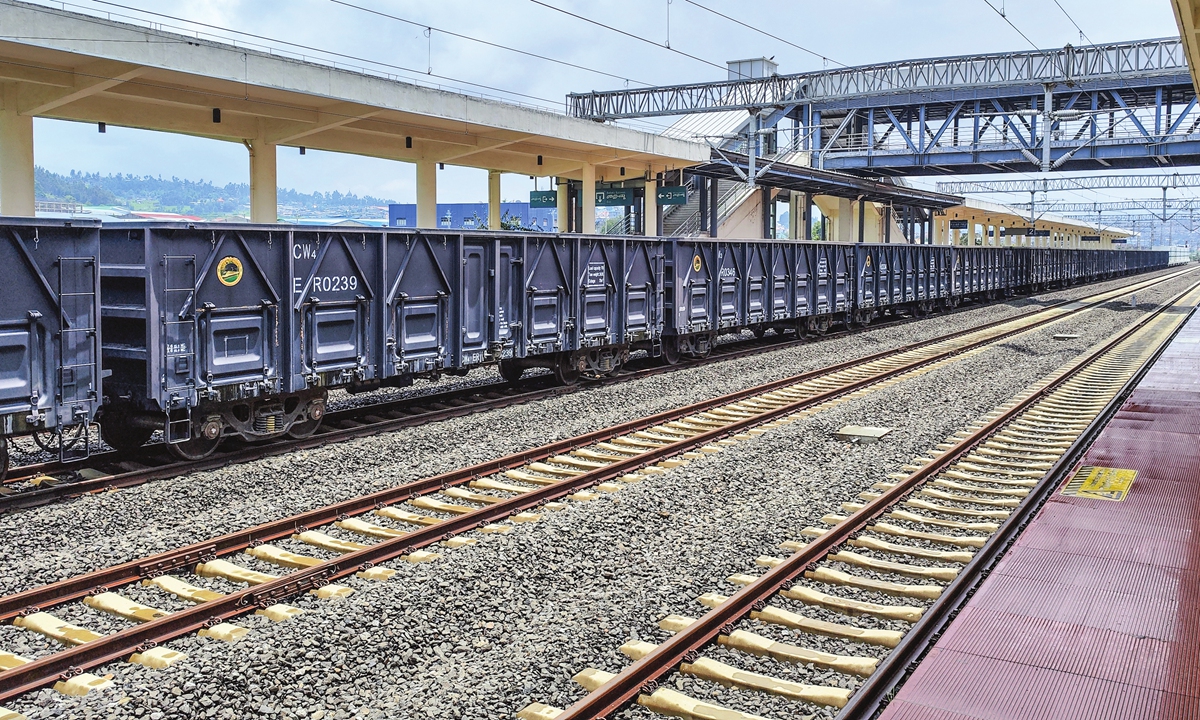
A view of Ethiopia-Djibouti railway in Addis Ababa, Ethiopia Photo: Yin Hao/GT
Harmony between mankind and nature
Africa is home to a large number of wild animals. At the beginning of the construction of the Mombasa-Nairobi SGR, Western media were busy attacking the project, claiming that the construction would affect the ecology of the park, endangering the wildlife and their natural habitats.
Parties from China and Kenya both denied such accusation.
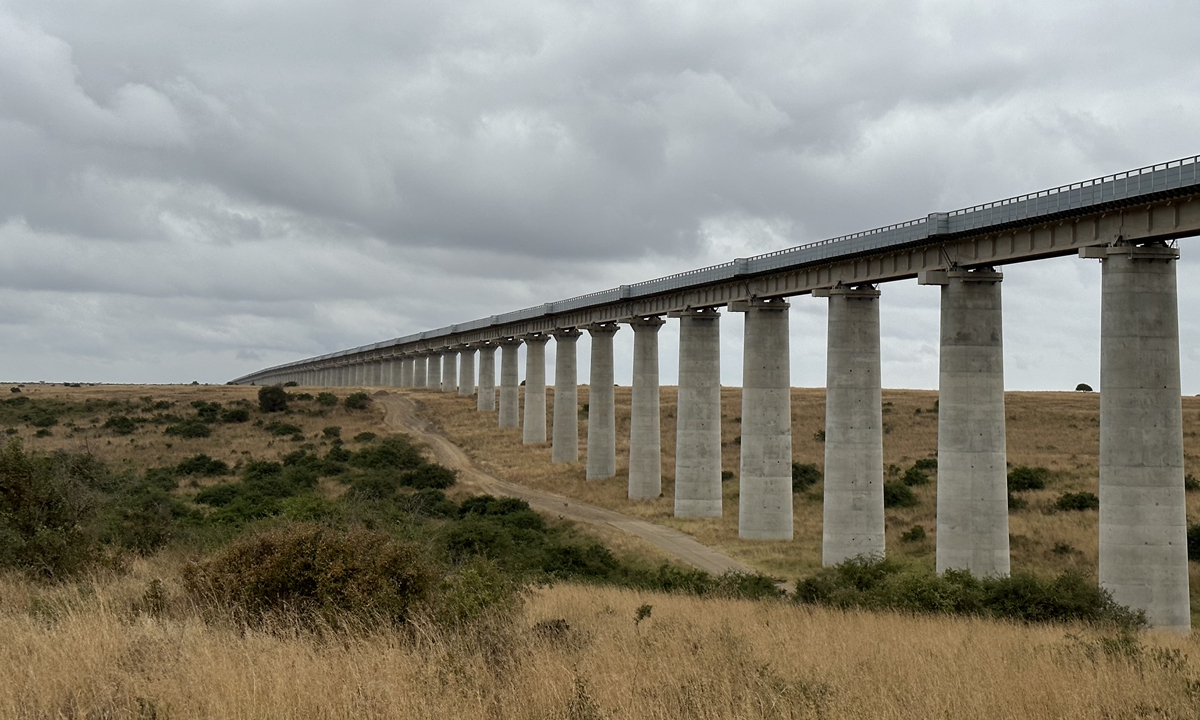
A view of the bridge where Mombasa-Nairobi SGR passes through the Nairobi National Park in Nairobi, Kenya, on August 6, 2023 Photo: Tu Lei/GT
The railway passes through Nairobi National Park, Tsavo National Park and other wildlife protection areas. To facilitate the passage of wild animals, animal passages have been built along the railway. Among them, the net height of the bridge-type animal passages is more than 6.5 meters, which is convenient for tall giraffes to pass through "upright", and the culvert-type animal passages are convenient for animals such as zebras to drink water, He Fuhan, vice general manager of Africa Star Railway Operation Company, the operator of the Mombasa-Nairobi SGR, told the Global Times.
We have a close watch on the railway. If we find any animals, we will remind the train drivers to take due care, and we will contact the animal protection organizations and ask them to help move the animals to a safe place, said Brian Boro, assistant manager of dispatch center with Mombasa-Nairobi SGR.
We also have a public emergency number. If people find animals along the line or any other situations occur, they can contact us 24 hours a day, and we will deal with them as soon as possible, he added.
The Global Times reporters also noticed that the bridge of the railway running in the Nairobi National Park is quite high, and it has no any barrier for even large animals to make a cross under the bridge.
The BRI does not only offer a path to economic prosperity, but also a path to green development, according to Guo Chongfeng from CCECC.
Taking the Ethiopia-Djibouti Railway as an example, during the preliminary due diligence phase, it was noticed that the project site cut through an area of virgin forest, inhabited by many wild animals, so at the beginning of the design, we considered the construction of animal passages, he said.
Due to the lack of industrialized technologies such as steel bars and cement, the cost of building animal passages in Ethiopia is about five times that in China, accounting for roughly three percent of the overall project cost.
But he said that although the cost has increased, bearing social responsibility in mind, Chinese companies will actively protect the local ecological resources and environment.
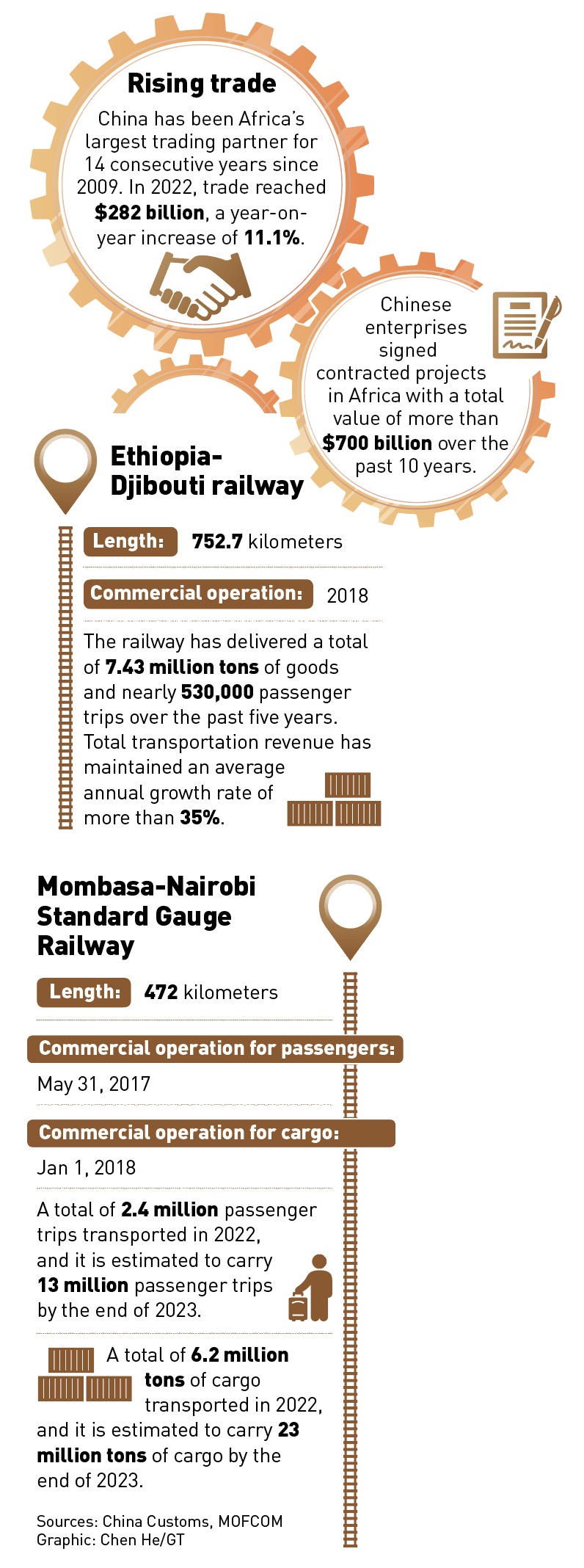
Graphic:Global Times
Self-defeated 'debt trap'
China has been Africa's largest trading partner for 14 consecutive years. China-Africa trade volume reached $282 billion in 2022, a growth of 11.1 percent than the previous year, according data from China Customs.
Keith Rockwell, a former chief spokesperson at the World Trade Organization, said recently that under the BRI, China had funded mega infrastructure projects in Africa and that China's relations with Africa were broad and deep and likely to remain strong for many years.
However, some in the West have coined numerous terms such as "neocolonialism", "debt trap" and "resource plundering" to slander China over the BRI in Africa.
These slanders are rebuffed by officials and local residents across the continent, with locals saying that they are very much proud to be part of BRI, for this long-term strategic vision can benefit Africa, and they can grow together, and trying to deny Africa is a skill mastered by the West during the colonial times, and such slander is unacceptable, many added.
This partnership is mutually recognized as being beneficial to all involved. Nobody is forcing the other systematically to enter into this agreement. African countries see the long-term benefit that they are acquiring through this partnership. The same goes for Chinese parties. Africans have the rational mindset to identify which partnership is beneficial and which is not beneficial for them, Dr. Abdi from the Ethiopia-Djibouti Railway Share Company said.
There is also no conditionality attached to these loans and no interference, so there is no trap being laid, whether there is partnership developing and emerging partnership developing, and our railway is becoming a game changer for the economic and social life betterment of our impoverished communities, Dr. Abdi added.
The West has no moral ground to criticize this partnership, because we know as Africans what kind of relationship we should have. The West's criticism is undermining Africa, because it denies African countries' capability to build partnerships on their own choices based on mutually respectable and beneficial arrangements, he noted.
China's Foreign Ministry also repeatedly refuted such allegations as having no factual basis when the US criticized China on Africa's debt issue.
China has always been committed to providing support to fellow developing countries, including African countries, for their socioeconomic development, always conducts investment and financing cooperation with them based on the principle of equality and mutual benefit and always does its best to help them reduce their overall debt burden, the Chinese Foreign Ministry highlighted.
China is not the source of African countries' "debt trap", but a partner to help these countries get out of poverty trap, Wang Wenbin, a spokesperson of the ministry said.
According to statistics from a World Bank report, nearly three quarters of Africa's total external debt is held by multilateral financial institutions and commercial creditors, and they combined hold the bulk of Africa's debt. The World Bank and the International Monetary Fund account for nearly 70 percent of Africa's debt owed to multilateral financial institutions, Wang said.
The US is the largest single shareholder of the World Bank and the IMF and the financial capital from the US and Europe is the biggest commercial creditor for African countries. They have unshakable responsibility in terms of resolving Africa's debt, Wang said.
"On the basis of respecting the will of the African people and African countries' needs, China will continue to help Africa with no political strings attached," Wang emphasized.
Ambassador of Tanzania to China Mbelwa Kairuki in an earlier interview with the Global Times also refuted what he called "propaganda" about the so-called "debt traps" being part of China-Africa cooperation, noting that the majority of the continent's debt is held by other countries and institutions.
"We have seen tremendous achievements in terms of connectivity between BRI countries, individual policy connectivity, trade connectivity, infrastructure connectivity, and people-to-people [exchanges]," Kairuki said.
In a report entitled "Africa's Economic Performance and Outlook" released by African Development Bank in January this year, it showed that the US Federal Reserve's aggressive interest rate hikes in 2022 heightened global uncertainty and contributed to investors exiting assets of emerging market economies, including African currencies, toward safe US treasuries.
Denying African development is a legacy from the colonial era that is still acceptable to the Western media. African countries enter into partnership, whether in financial or other capacities, when they see it as beneficial to their country and when it is mutually beneficial to the other party in similar manner, Dr. Abdi said.
"The BRI creates a platform for a mutually respectable relationship, not an exploitative relationship. In this relationship, there is sufficient respect for the other party as well. The BRI and the commitment that come with it represent a long term strategic vision of benefitting together and allowing all to grow together," Dr. Abdi added.


